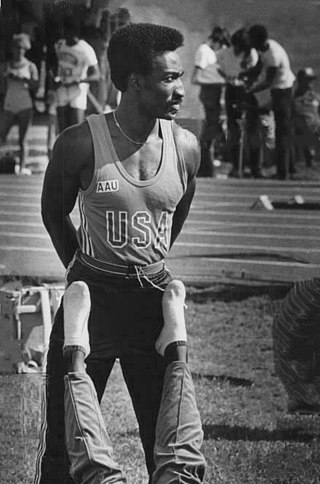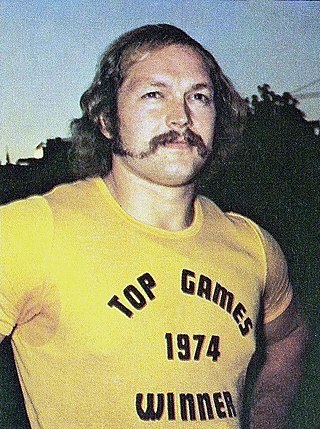Related Research Articles

Harvey Edward Glance was an American sprint runner. He won gold medals in tandem with his teammates at the 4 × 100 m relay at the 1976 Summer Olympics, 1979 and 1987 Pan American Games, and 1987 World Championships.

Chandra Danette Cheeseborough is a retired American sprinter. She won two gold medals and a silver at the 1984 Summer Olympics in Los Angeles.
James Walker is a former American hurdler. Born in Atlanta, Georgia, he attended Auburn University from 1976-1980. Walker was one of "The Fabulous Four" along with teammates Harvey Glance, Willie Smith, and Tony Easley; together they set more school and conference records than any other foursome in the history of the Southeastern Conference. Walker qualified for the 1980 U.S. Olympic team but did not compete due to the 1980 Summer Olympics boycott. He did however receive one of 461 Congressional Gold Medals created especially for the spurned athletes.

Allan "Al" Dean Feuerbach is a former American track and field athlete. He competed in the shot put at the 1972 and 1976 Olympics and finished in fifth and fourth place, respectively. He missed the 1980 Games due to the boycott by the United States. He did however receive one of 461 Congressional Gold Medals created especially for the athletes.
Stanley Floyd is a retired track and field sprinter from the United States. He was a 1979 graduate of Dougherty High School in Albany, Georgia. In 1980, he was considered one of the favorites for the 100m title but was denied his chance due to the United States boycott of the 1980 Summer Olympics.
Donald J. Paige is an American retired middle-distance runner.

Carol LeGrant Lewis is an American former track and field athlete who specialized in the long jump. She is the 1983 World Championship bronze medalist, and a 4-time US Champion. Her best long jump of 7.04 meters in 1985 is the former American record. She is the sister of 9-time Olympic gold medalist Carl Lewis, and former professional soccer player Cleveland Lewis. She is also the daughter of retired American hurdler Evelyn Lawler.
Willie James Smith III was an American athlete who was the national champion 400 metres runner in 1979-80, and a gold medal winner at the 1984 Olympics in the 4 × 400 m relay.
Melvin Lattany is a former American track athlete. He was one of the world's dominating sprinters in the early 1980s.
Dedy Cooper is a retired American track and field athlete, known for specializing in the hurdles.
David Lee is an American former hurdler. Lee qualified for the 1980 U.S. Olympic team but was unable to compete due to the 1980 Summer Olympics boycott. He did however receive one of 461 Congressional Gold Medals created especially for the spurned athletes.
William Ernest Green was an American sprinter.
Candy Young is a retired American track and field athlete who was a record-setting hurdler at Beaver Falls High School in Beaver Falls, Pennsylvania.
Maren Elizabeth Seidler is a retired American track and field athlete. She dominated the shot put from the mid-1960s through 1980. She won the event at the USA Outdoor Track and Field Championships eleven times starting in 1967, including nine in a row from 1972 to 1980. She was the American champion indoors nine times, 1968–9, 1972, 1974-5 and 1977 to 1980. She won her event at the United States Olympic Trials four straight times 1968–1980, a feat only equalled by only one woman, Madeline Manning, Edwin Moses is the only man to achieve four. Jackie Joyner Kersee is the only woman who has won more events at the Olympic Trials, split between the long jump and heptathlon. She competed in the Olympics three times, making the final twice. Her 1980 selection was quashed by the 1980 Summer Olympics boycott. Seidler did however receive one of 461 Congressional Gold Medals created especially for the spurned athletes.
Charles Douglas Brown is a retired American track and field athlete, whose specialty was the Steeplechase.
Sharon Dabney is a retired American track and field athlete.
Bobby Coffman is an American former track and field athlete who competed in the decathlon. He set his personal record of 8274 points in Quebec City on August 12, 1979.
James Butler is an American former track and field sprinter who specialized in the 200-meter dash. He was an NCAA champion and winner at the Liberty Bell Classic Olympic boycott event. He represented the United States at the 1987 IAAF World Indoor Championships and placed fifth. He set a 200 m best of 20.23 seconds in 1982.
Rod Ewaliko is an American track and field athlete known for the Javelin throw. He was the 1983 National Champion and won the 1980 Olympic Trials to become a member of the team that did not participate in the Olympics due to the 1980 Summer Olympics boycott. He was one of 461 athletes to receive a Congressional Gold Medal instead. Ewaliko would finish in second place in the National Championships five times. He threw in two other Olympic Trials, finishing sixth in 1976 and was unable to land a legal throw in the finals of 1984.
Bruce Kennedy is a Rhodesian, then American track and field athlete known for the javelin throw. He has been dubbed "one of the unluckiest athletes in Olympic history" not because of his failures at the Olympics but due to the political nature of his inability to appear at the Olympics. Born in Southern Rhodesia, he first came to the United States to study at the University of California, Berkeley. He qualified for the Rhodesian team for the 1972 Olympics, but when he arrived in Munich, he was not allowed to take the field. The government of Rhodesia, created when Kennedy was 14 years old, had never been recognized as a legitimate government and its athletes, including Kennedy, were excluded from the Olympics. He made the Rhodesian Olympic team again in 1976, but was not welcome at the Olympics. After eight years in the United States, he was able to obtain American citizenship in 1977 and compete for his new country. He finished second at the 1980 Olympic Trials but by that point in time, President Jimmy Carter had already declared the 1980 Summer Olympics boycott. He was one of 461 athletes to receive a Congressional Gold Medal instead. He was able to attend the 1984 Olympics near his home in Santa Barbara, California, working as an usher.
References
- ↑ Smith, Todd A. (2008-07-01). African Americans in Sports: Jackie Robinson of Gymnastics A Dream Denied Archived 2017-02-10 at the Wayback Machine . Regal Magazine. Retrieved on 2016-04-10.
- ↑ New Book Chronicling 1980 U.S. Olympic Boycott Features Stories From Four Members of USA Olympic Swim Team. Swimming World Magazine (2008-05-22). Retrieved on 2016-04-10.
- ↑ UNLV Rebels Outdoor Individual Records Archived 2017-02-10 at the Wayback Machine . UNLV Rebels. Retrieved on 2016-04-10.
- ↑ Hymans, Richard (2008). The History of the United States Olympic Trials - Track and Field Archived 2016-03-27 at the Wayback Machine . USA Track and Field. Retrieved on 2016-04-09.
- ↑ Olympic Boycott Games. GBR Athletics. Retrieved on 2016-04-09.
- ↑ Gwen Gardner. Track and Field Brinkster. Retrieved on 2016-04-10.
- ↑ Caroccioli, Tom; Caroccioli, Jerry. Boycott: Stolen Dreams of the 1980 Moscow Olympic Games. Highland Park, IL: New Chapter Press. pp. 243–253. ISBN 978-0942257403.